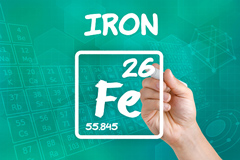
Iron is an important trace element in the human body. Most importantly, this trace element is essential for supplying human tissues, organs and systems with oxygen, it is the basis for comfortable vital activity and functioning of various body processes.
- participates in the formation of hemoglobin, forms oxygen stores in the blood and takes part in its transportation to organs
- supports the work of the thyroid gland
- increases the body's resistance to pathogenic bacteria, forms immunity
- participates in metabolic processes
- protects the body from the action of toxic substances
The norm of iron in the blood may vary and depends on various factors, including sex, age, height and weight.
The daily allowance of iron:
- for women is 15-20 mg
- for men - 8-10 mg
Causes of iron deficiency: insufficient iron intake and increased demand.
In the first case we are talking about improper nutrition, in the second deficiency can be caused by:
- active growth in children
- pregnancy (fetal needs)
- absorption disorders (gluten disease, Crohn's disease, gastric diseases, old age)
- blood loss (menstrual or internal intestinal)
- taking medications to treat GI diseases (antacids, proton pump inhibitors, H2-blockers)
- intensive sports (increases the need for trace elements)
Iron deficiency in very rare cases, possible in some hereditary diseases.
The need for the trace element increases during pregnancy: in some cases, the daily allowance may be increased.
Decrease in the level of iron in the body - a common phenomenon that leads to a violation of the synthesis of hemoglobin - iron-containing protein of blood erythrocytes and because of developing oxygen starvation - the heart, brain, and kidneys suffer.
Symptoms of iron deficiency:
- rapid fatigue, the person feels cold
- experiences shortness of breath during exertion
- skin pale, flaky
- hair loss
Specific symptoms of iron deficiency development:
- nail plates take on a concave shape
- food perversions, cravings for inedible things (chalk, lime...).
- inflammation of the tongue, accompanied by burning and pain.
- inflammation of the red border of the lips with cracks in the corners of the mouth.
Swallowing disorders and loss of consciousness are possible when iron levels drop to critical levels.
Children have delayed development due to iron deficiency.
It is possible to prevent the development of deficiency conditions by paying proper attention to nutrition, including appropriate foods in the diet, if necessary using special biologically active supplements.
The best sources of iron: red meat and by-products (liver, heart), to a lesser extent eggs, legumes (lentils, beans), pumpkin and sesame seeds, whole-grain cereals (buckwheat groats), dried fruits (apples, pears, prunes), as well as some types of greens - thyme, parsley, field lettuce.
Dietary iron is categorized into heme iron (from meat and other animal sources) and non-heme iron (from plant foods).
Heme iron is assimilated most efficiently, while the assimilation of non-heme iron is influenced by numerous factors.
The absorption of iron is improved by ascorbic acid consumed with food.
Phytic acid, oxalates, tannins and caffeine prevent iron absorption.
Excessive accumulation of iron in the body has a toxic effect. Iron overdose stimulates the production of free radicals, depresses the antioxidant system of the body and is likely to contribute to the development of atherosclerosis, so the use of iron preparations for healthy people is not recommended.
Important!
Remember, taking preparations and other dietary supplements to fill iron deficiency, it is necessary only after taking tests and consulting a doctor!



